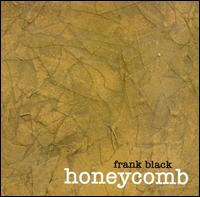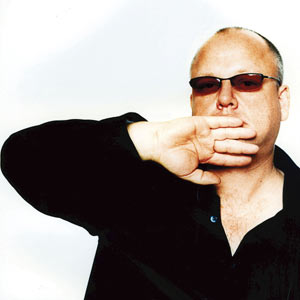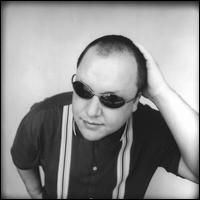 As leader of Boston-based ‘80s indie rock icons, the Pixies, Frank Black inspired the entire ‘90s Seattle grunge scene as well as various British shoegazers and mod garage rockers from far and wide. Becoming a soloist for three fine albums and then leader of backup troupe the Catholics for six more prior to their ’04 demise, this gigantic Pixie continually mellows like fine wine. His early influences include ‘60s legends such as the Beatles, Donovan, Leon Russell, John Mayall, Jimi Hendrix, Paul Butterfield Blues Band, and most profoundly for his latest work, Bob Dylan’s Nashville-recorded Blonde On Blonde.
As leader of Boston-based ‘80s indie rock icons, the Pixies, Frank Black inspired the entire ‘90s Seattle grunge scene as well as various British shoegazers and mod garage rockers from far and wide. Becoming a soloist for three fine albums and then leader of backup troupe the Catholics for six more prior to their ’04 demise, this gigantic Pixie continually mellows like fine wine. His early influences include ‘60s legends such as the Beatles, Donovan, Leon Russell, John Mayall, Jimi Hendrix, Paul Butterfield Blues Band, and most profoundly for his latest work, Bob Dylan’s Nashville-recorded Blonde On Blonde.
Taking the same linear path Dylan did in ’66, Black headed to Nashville in ‘05 and got a southerly soul producer, in this case, Jon Tiven (B.B. King/ Wilson Pickett/ Delbert Mc Clinton), to assemble a sterling cast of veteran musicians to lend a hand on his latest batch of tunes. The result, Honeycomb, probably goes better with a bottle of Chardonnay than the beer and a shot doubtlessly quaffed listening to his clamorous Catholics barroom stomps. Famed Muscle Shoals musicians, bassist David Hood and keyboardist Spooner Oldham, respected session drummer Anton Fig, and renowned Stax Records/ Booker T guitarist Steve Cropper provide solid assistance.
Black croons through lightly buoyant originals such as stormy Crescent City memento “Selkie Bride,” soothingly percussive soft-pop lucidity “I Burn Today,” and spookily hushed visage “Lone Child,” keeping the overall mood sedate. He brings an easygoing melodic shuffle to Tex-Mex organist Doug Sahm’s earthy “Sunday Sunny Mill Valley Groove Day.” Studio engineer-owner Dan Penn co-wrote R & B standard “Dark End Of The Street,” which Black learned from Country-rock casualty Gram Parsons’ version and herein receives a compelling blanched blues-y falsetto sensitivity. Meanwhile, Black also borrowed Elvis’ goofy Girls Girls Girls film track “Song Of The Shrimp,” giving the novelty a speak-sung interpretation acquired from deceased Texas Country-folk phenom Townes Van Zandt’s out of tempo live rendition.
Last time I tried to interview you, your vintage equipment had been stolen by some assholes. Did you ever get it back?
FRANK: Never found it. It was stolen outside Philadelphia. I’m sure it went straight into a container ship. But life’s worked out. I’ve accumulated more vintage gear. My brother bought me a nice ’54 Telecaster last year. It’s a lovely guitar.
How’d producer Jon Tiven bring you together with all those veteran Nashville musicians for Honeycomb?
He’s got an extensive black book. He works with many musicians from all backgrounds. He’s 50 now, so he actually was a writer for Rolling Stone at age 15 or 16. So he’s been involved with music for a long time. He was even part of New York’s punk scene.
Did living out in woodsy western Massachusetts during your UMass college days inspire the folksy retreats?
I didn’t grow up there. I lived bi-coastal between Massachusetts and California. But certainly lots of people from my generation and hopefully people younger than me got exposed to a lot of folk, blues, Rhythm & Blues, and Gospel…especially Classic rock and roll. You hear it on the radio or through parents’ record collections. People get exposed to more classic music than they think.
When you moved from L.A. to Portland, Oregon during the ‘90s, did the literary scene there influence you?
I wasn’t involved in any Portland scene. I was learning how to live alone (after divorce). I lived in a big loft, but now I’m 100 miles south. When I split up with my wife I moved.
Peculiarly, your ex-wife sings on “Strange Goodbye.” Was that song based on true recollections?
Yeah. Absolutely. That’s our parting shot as the happy couple. We had a friendly divorce and love each other. We had a pact early in our relationship that if we broke up, we’d remain friends.
Some of Honeycomb’s more melodious moments reminded me of ‘70s soft rocker Andy Fairweather-Low. Do you know him?
I heard his name but don’t know his music.
Your crooning was unexpected. Did you practice octave scales?
No. It’s just the type of material that got written. I give a lot of credit to my singing teacher who has helped me in the past five years.
There’s a newfound sensibility and vulnerability adding dramatic intrigue to your latest song batch.
Sure. You go through something dramatic in your life – an old relationship ends and a new one is starting. You move from a city you’ve been in 12 years, break up a former band (the Catholics) and reunite another (the Pixies). So you feel beat up, give up, say ‘fuck it,’ and become inspired. It’s a good place to be now.
You’ve got to be proud of the Pixies accomplishments and the amount of fans coming out in droves for the reunion tours.
It’s wonderful. I was bragging about my new record to them but still begging them to please listen to it. It was probably a buzzkill for them. Here we are over a decade later on the verge of playing our first shows together and I’m caught up with my Nashville record. That’s what happens when you come out of the studio excited about something.
Will you support Honeycomb with any tour dates even though the Pixies are scheduled to be on the road all summer?
I guess by talking (to the press) I’ll get exposure. I’ve been talking to those guys about doing a tour but they’re all busy. If we do it, it’ll be later in the year. Steve Cropper does a lot of live work with Booker T & the MG’s and a band under his own name. Spooner Oldham was setting up a session with Neil Young tomorrow.
Spooner’s keyboard playing seemed to dictate Honeycomb’s mellow flow.
Those guys expressed a lot of restraint. He was shockingly almost absent for the first half of a section of a song. Suddenly, his hands would fall on to the keyboards in almost a bumbling way. He’s as soft and gentle as his playing, personality-wise. They all added to that poignancy. They’re not really about playing loud. They’re about the groove and playing off each other and the singer.
What did you learn from those seasoned musicians that will resonate for the rest of your life?
I suppose the greatest thing I observed, which is no great mystery, is they proved their prowess by listening to what I was singing and locked into what they were playing. They didn’t have to refer to the charts. They never even rehearsed the songs and many were done in one or two takes.
Some of your Catholics songs were made in one take.
Yeah. After solo debut, Cult Of Ray, the first Catholic record represented very few takes, but a lot of rehearsal. Sometimes we’d need 50 takes. At Dan Penn’s studio, we recorded some multi-tracks for this album. Technically, there were overdubs, but we were always playing together. Nashville is at the crossroads of America, whether it’s rock and roll, blues, or Gospel. It’s all been going on there for a hundred years. I didn’t have any clear vision. I wrote some songs and asked Tiven to hook me up with a band. I wrote chord charts with bassist David Hood, counted them off, and played them. I knew the situation I was getting into and it may have affected the type of songs I wrote semi-subconsciously. But it wasn’t a tailor made vision.
What have you been listening to recently?
I can’t say I listen to anything new, mostly Classical and Jazz for no particular reason. I got into older ‘30s Jazz combo things like Stuff Smith and jumpin’ jive. I like that because it’s closer to rock and roll and related to the popular song form – three minutes and lots of vocals. But I also love John Coltrane, Thelonius Monk, and Chet Baker.
How will the Pixies tour differ from last years’ excursion?
We’ll do a few different songs, but nothing worth reporting on. We just play the songs the way they went down in the ‘80s. We already wrote the songs. Now we’re just playing them live. We don’t know if we’ll record new songs. We haven’t booked a studio. We’re too busy driving around in our tour bus collecting briefcases full of cash. (laughter)
